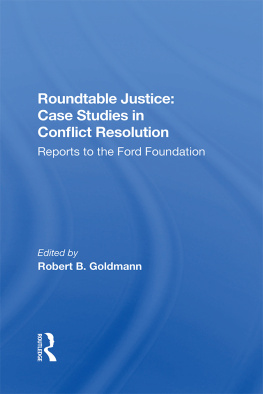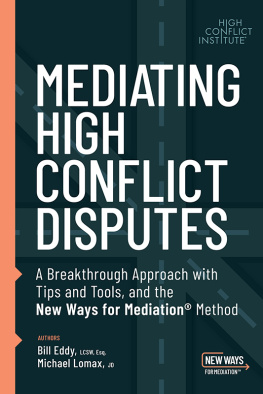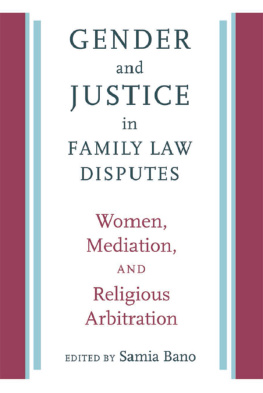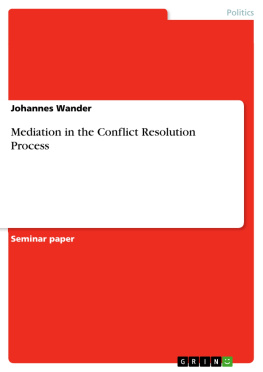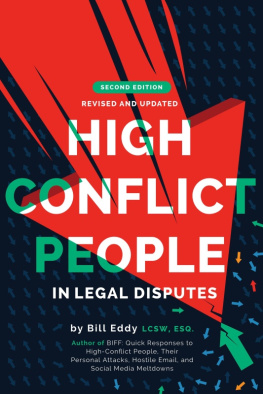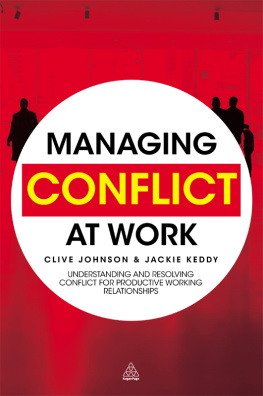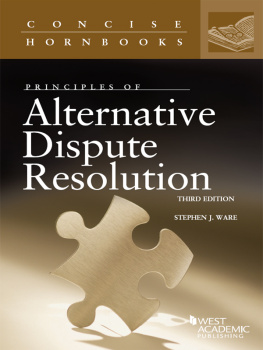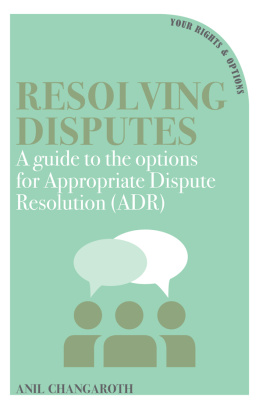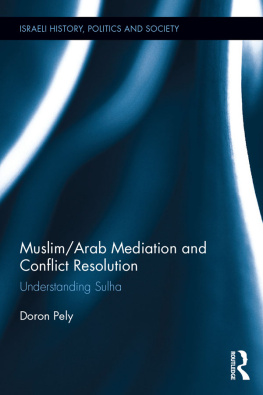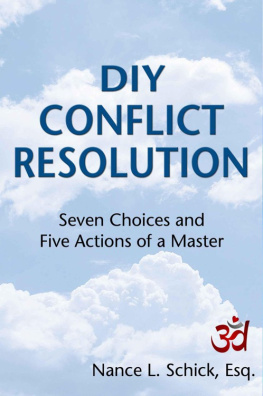Roundtable Justice: Case Studies in Conflict Resolution
Other Titles in This Series
The War System: An Interdisciplinary Approach, edited by Richard A. Falk and Samuel S. Kim
Bibliography on World Conflict and Peace: Second Edition, compiled by Elise Boulding, J. Robert Passmore, and Robert Scott Gassier
Conflict Regulation, Paul Wehr
The Myth of Victory: What Is Victory in War? Richard Hobbs
Also of Interest
Environmental Mediation: The Search for Consensus, edited by Laura M. Lake
The ELF Odyssey: Rational Security Versus Environmental Protection, Lowell L. Klessig and Victor L. Strite
Westview Special Studies in Peace, Conflict, and Conflict Resolution
Roundtable Justice: Case Studies in Conflict Resolution
REPORTS TO THE FORD FOUNDATION
edited by Robert B. Goldmann
This book describes seven cases in which third-party intervention was employed to settle complex social and economic disputes ranging from conflict among developers, farmers, environmentalists, and others over the construction of a dam in Washington State; to school integration conflicts in Atlanta, Georgia, and Dayton, Ohio; to the claims of the Mohawk Indians in the state of New York. All the disputes had been headed for litigation; however, responding to leadership from the government and other concerned sources, those involved agreed to mediation and negotiation as an alternative.
The authors provide detailed accounts of how mediation came about in each case, how it was conducted, the settlements that resulted, and the follow-up that was required. Demonstrating the potential of third' party intervention for resolving the growing number of disputes in society today, they also show how, in practical terms, conflicts can be resolved.
Robert B. Goldmann is a program officer, Division of National Affairs, with the Ford Foundation. He has also served as deputy director of the Governor's Commission on Civil Disorders in New Jersey and as director of public affairs for the New York City Human Resources Ad' ministration.
Roundtable Justice: Case Studies in Conflict Resolution
Reports to the Ford Foundation
edited by Robert B. Goldmann
First published 1980 by Westview Press
Published 2019 by Routledge
52 Vanderbilt Avenue, New York, NY 10017
2 Park Square, Milton Park, Abingdon, Oxon OX14 4RN
Routledge is an imprint of the Taylor & Francis Group, an informa business
Copyright 1980 by the Ford Foundation
All rights reserved. No part of this book may be reprinted or reproduced or utilised in any form or by any electronic, mechanical, or other means, now known or hereafter invented, including photocopying and recording, or in any information storage or retrieval system, without permission in writing from the publishers.
Notice:
Product or corporate names may be trademarks or registered trademarks, and are used only for identification and explanation without intent to infringe.
Library of Congress Cataloging in Publication Data
Main entry under title:
Roundtable justice, case studies in conflict resolution.
(Westview special studies in peace, conflict, and conflict resolution)
Includes index.
1. Justice, Administration ofUnited StatesAddresses, essays, lectures. 2. CourtsUnited StatesAddresses, essays, lectures. 3. Compromise (Law)United StatesAddresses, essays, lectures. 4. Arbitration and awardUnited StatesAddresses, essays, lectures. 5. Third parties (Law)United StatesAddresses, essays, lectures. I. Goldmann, Robert, 1921 II. Series.
KF384.A2R68 347.731 80-13357
ISBN 13: 978-0-367-28622-4 (hbk)
Contents
, Robert B. Goldmann
, Richard Kwartler
, Stephen Gillers
, Lee Dembart and Richard Kwartler
, Stephen Gillers
, Joel L. Fleishman
, Joel L. Fleishman
, Graham S. Finney
For close to a decade, the Ford Foundation has supported a variety of efforts to advance both knowledge about and the use of alternatives to the adversary process for the settlement of disputes. The Center for Dispute Settlement of the American Arbitration Association; the Institute for Mediation and Conflict Resolution in New York City; the Center for Community Justice in Washington, D.C.; the Institute for Environmental Studies at the University of Washington in Seattle, Washington; and the Office of Environmental Mediation at the University of Wisconsin have played a major role in advancing the state of the art in the disposition of major disputes as well as in introducing mechanisms for grievance management and conflict resolution.
The foundation remains committed to this work because it foresees the need for more rather than fewer efforts to find ways to resolve disputes fairly and efficiently. Beyond third-party intervention, which will always be central in such efforts, the foundation is now exploring ways to help groups concerned with improving procedures of existing institutions, including the courts and administrative and regulatory agencies.
The documentation of the cases in this volume is not limited to work done by grantees of the foundation. The selection of cases was based on substantive criteria, in the hope of making through this volume one more contribution to knowledge about conflict resolution in our society.
The book represents a truly cooperative endeavor. The authors of the chapters participated in the development of the guidelines of the research. Each author reported and wrote on his case or cases. The editor's task was to coordinate the work of the authors. It was a stimulating job, because each author brought special experience and insights to the work. I am grateful to Richard Kwartler, Stephen Gillers, Lee Dembart, Joel Fleishman, and Graham Finney, who have documented and illustrated a growing trend toward making this a fairer and more resilient society.
Robert B. Goldmann
Robert B. Goldmann (editor) has been a program officer in the National Affairs Division of the Ford Foundation for the past twelve years. He was previously an editor of Vision, the Latin American news magazine, and public affairs director of the New York City Human Resources Administration. Earlier in his career, Mr. Goldmann served in the federal government as director of news of the Voice of America (1958-1962) and as director of public affairs of the Alliance for Progress, the U.S. aid program for Latin America (1962-1965).
Richard Kwartler is executive vice-president of the Criminal Justice Institute, a nonprofit agency in New York City that operates the National Center for Correctional Mediation. He is the editor of Behind Bars: Prisons in America. In 1974 he founded Corrections Magazine and served as editor and publisher for three years. Previously, Mr. Kwartler helped establish the first national program to train members of minority groups for careers in broadcast and print journalism.
Stephen Gillers is associate professor of law at New York University. He is the author or editor of half a dosen books on law and lawrelated subjects and has contributed to numerous periodicals. Before teaching, he practiced law for ten years.
Lee Dembart is a science writer for the Los Angeles Times. He was formerly city hall bureau chief of the New York Times.

